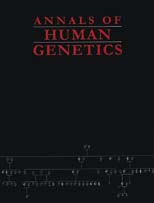Crossref Citations
This article has been cited by the following publications. This list is generated based on data provided by
Crossref.
COOK, EDWIN H.
1999.
The Early Development of Child Psychopharmacogenetics.
Journal of the American Academy of Child & Adolescent Psychiatry,
Vol. 38,
Issue. 12,
p.
1478.
Veenstra-VanderWeele, Jeremy
Anderson, George M
and
Cook, Edwin H
2000.
Pharmacogenetics and the serotonin system: initial studies and future directions.
European Journal of Pharmacology,
Vol. 410,
Issue. 2-3,
p.
165.
Allison, David B.
and
Neale, Michael C.
2001.
Joint Tests of Linkage and Association for Quantitative Traits.
Theoretical Population Biology,
Vol. 60,
Issue. 3,
p.
239.
Eaves, Lindon J.
and
Sullivan, Patrick
2001.
Vol. 42,
Issue. ,
p.
223.
Sonuga-Barke, Edmund J.S
2002.
Psychological heterogeneity in AD/HD—a dual pathway model of behaviour and cognition.
Behavioural Brain Research,
Vol. 130,
Issue. 1-2,
p.
29.
Schulze, Thomas G.
and
McMahon, Francis J.
2002.
Genetic association mapping at the crossroads: Which test and why? Overview and practical guidelines.
American Journal of Medical Genetics,
Vol. 114,
Issue. 1,
p.
1.
Beaty, T.H.
Hetmanski, J.B.
Zeiger, J.S.
Fan, Y.T.
Liang, K.Y.
VanderKolk, C.A.
and
McIntosh, I.
2002.
Testing candidate genes for non‐syndromic oral clefts using a case‐parent trio design.
Genetic Epidemiology,
Vol. 22,
Issue. 1,
p.
1.
Hernández-Sánchez, Jules
Waddington, Dave
Wiener, Pamela
Haley, Chris S.
and
Williams, John L.
2002.
Genome-wide search for markers associated with bovine spongiform encephalopathy.
Mammalian Genome,
Vol. 13,
Issue. 3,
p.
164.
Waldman, Irwin D.
2003.
Neurodevelopmental Mechanisms in Psychopathology.
p.
257.
Kirley, Aiveen
Lowe, Naomi
Hawi, Ziarih
Mullins, Celine
Daly, Grainne
Waldman, Irwin
McCarron, Mary
O'Donnell, Deirdre
Fitzgerald, Michael
and
Gill, Michael
2003.
Association of the 480 bp DAT1 allele with methylphenidate response in a sample of Irish children with ADHD.
American Journal of Medical Genetics Part B: Neuropsychiatric Genetics,
Vol. 121B,
Issue. 1,
p.
50.
Alcaïs, Alexandre
and
Abel, Laurent
2003.
Removing phenotypic distribution assumptions from tests of linkage disequilibrium for quantitative traits.
Genetic Epidemiology,
Vol. 24,
Issue. 3,
p.
191.
Kuznetsova, Tatiana
Staessen, Jan A.
Thijs, Lutgarde
Kunath, Christiane
Olszanecka, Agnieszka
Ryabikov, Andrew
Tikhonoff, Valérie
Stolarz, Katarzyna
Bianchi, Giuseppe
Casiglia, Edoardo
Fagard, Robert
Brand-Herrmann, Stefan-Martin
Kawecka-Jaszcz, Kalina
Malyutina, Sofia
Nikitin, Yuri
and
Brand, Eva
2004.
Left Ventricular Mass in Relation to Genetic Variation in Angiotensin II Receptors, Renin System Genes, and Sodium Excretion.
Circulation,
Vol. 110,
Issue. 17,
p.
2644.
Stolarz, Katarzyna
Staessen, Jan A.
Kawecka-Jaszcz, Kalina
Brand, Eva
Bianchi, Giuseppe
Kuznetsova, Tatiana
Tikhonoff, Valérie
Thijs, Lutgard
Reineke, Thomas
Babeanu, Speranta
Casiglia, Edoardo
Fagard, Robert
Filipovský, Jan
Peleška, Jan
Nikitin, Yuri
Struijker-Boudier, Harry
and
Grodzicki, Tomasz
2004.
Genetic Variation in
CYP11B2
and
AT1R
Influences Heart Rate Variability Conditional on Sodium Excretion
.
Hypertension,
Vol. 44,
Issue. 2,
p.
156.
Kistner, Emily O.
and
Weinberg, Clarice R.
2004.
Method for using complete and incomplete trios to identify genes related to a quantitative trait.
Genetic Epidemiology,
Vol. 27,
Issue. 1,
p.
33.
Kirley, Aiveen
Lowe, Naomi
Mullins, Celine
McCarron, Mary
Daly, Grainne
Waldman, Irwin
Fitzgerald, Michael
Gill, Michael
and
Hawi, Ziarih
2004.
Phenotype studies of the DRD4 gene polymorphisms in ADHD: Association with oppositional defiant disorder and positive family history.
American Journal of Medical Genetics Part B: Neuropsychiatric Genetics,
Vol. 131B,
Issue. 1,
p.
38.
Lake, S. L.
and
Laird, N. M.
2004.
Tests of Gene‐Environment Interaction for Case‐Parent Triads with General Environmental Exposures.
Annals of Human Genetics,
Vol. 68,
Issue. 1,
p.
55.
Misener, V L
Luca, P
Azeke, O
Crosbie, J
Waldman, I
Tannock, R
Roberts, W
Malone, M
Schachar, R
Ickowicz, A
Kennedy, J L
and
Barr, C L
2004.
Linkage of the dopamine receptor D1 gene to attention-deficit/hyperactivity disorder.
Molecular Psychiatry,
Vol. 9,
Issue. 5,
p.
500.
Kuznetsova, Tatiana
Staessen, Jan A
Stolarz, Katarzyna
Ryabikov, Andrew
Tikhonoff, Valérie
Olszanecka, Agnieszka
Bianchi, Giuseppe
Brand, Eva
Casiglia, Edoardo
Dominiczak, Anna
Fagard, Robert
Malyutina, Sofia
Nikitin, Yuri
and
Kawecka-Jaszcz, Kalina
2004.
Relationship between left ventricular mass and the ACE D/I polymorphism varies according to sodium intake.
Journal of Hypertension,
Vol. 22,
Issue. 2,
p.
287.
Zhang, Haifeng
Li, Xinli
Huang, Jun
Li, Yan
Thijs, Lutgarde
Wang, Zhenzhen
Lu, Xinzheng
Cao, Kejiang
Xie, Sifeng
Staessen, Jan A
and
Wang, Ji-Guang
2005.
Cardiovascular and metabolic phenotypes in relation to the ADRA2B insertion/deletion polymorphism in a Chinese population.
Journal of Hypertension,
Vol. 23,
Issue. 12,
p.
2201.
Bellgrove, Mark A.
Hawi, Ziarih
Lowe, Naomi
Kirley, Aiveen
Robertson, Ian H.
and
Gill, Michael
2005.
DRD4gene variants and sustained attention in attention deficit hyperactivity disorder (ADHD): Effects of associated alleles at the VNTR and −521 SNP.
American Journal of Medical Genetics Part B: Neuropsychiatric Genetics,
Vol. 136B,
Issue. 1,
p.
81.




